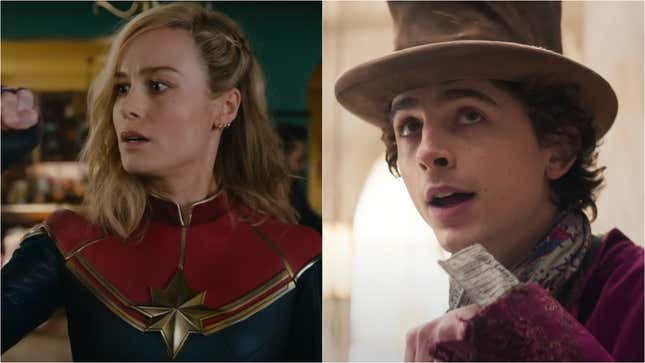
It doesn’t take a lot of pure imagination to notice that the language surrounding Wonka’s $39 million opening this past weekend was a whole lot more sugary than what was used to describe The Marvels’ $47 million debut last month. We’re not exempt; The A.V. Club, for example, called Wonka’s haul “a sweet debut” while The Marvels got “Marvel’s The Marvels opens at the top of the weekend box office, and let’s leave it at that.” As headlines praising the Timothée Chalamet-led reboot rolled in, MCU fans on Twitter/X were quick to point out the disparity in coverage, which was pretty hard to ignore. The real question is why this disparity happened in the first place.
Yes, The Marvels technically made more money in its opening weekend than Wonka, but these amounts don’t exist in a vacuum. At $275 million, The Marvels’ budget was over double Wonka’s ($125 million), which obviously makes a huge difference in what should have been its overall earning potential. The Marvels also experienced a drastic 77 percent drop in ticket sales during its second week, while Wonka, as a family-friendly nostalgia bomb, will likely see continued success into the holiday weekend.
As the lowest domestic opening of the entire 33-film series, The Marvels was also a flop for Marvel specifically, while Wonka—despite its candy-coated franchise connections—had less to live up to. Wonka also pulled in its dollars despite the fact movie musicals are on the outs nowadays (regardless of the fact that the film was barely marketed as a musical in the first place), which is also an interesting piece of data to add to the picture as a whole.
Still, despite the odds stacked against it, The Marvels didn’t deserve what it got. As many have pointed out, a lot of the criticism leveled against the Iman Vellani, Brie Larson, and Teyonah Parris-led superhero film feels particularly pointed against Nia DaCosta, a Black, female director. Even though the film likely underperformed due to marketing and, more importantly, growing fatigue with the MCU, Disney CEO Bob Iger was quick to throw DaCosta under the bus when asked to explain his hand in the numbers. DaCosta’s poor treatment in general has lent a particularly nasty taste to a lot of this criticism.
In general, though, these numbers tell the same story that films like Barbie, Five Nights At Freddy’s, and even The Hunger Games: The Ballad Of Songbirds And Snakes have been illustrating all year. A little IP is okay, as long as it’s handled in a fresh, creative, and genuinely artful way. Another repeat of the same old thing simply isn’t going to cut it anymore.